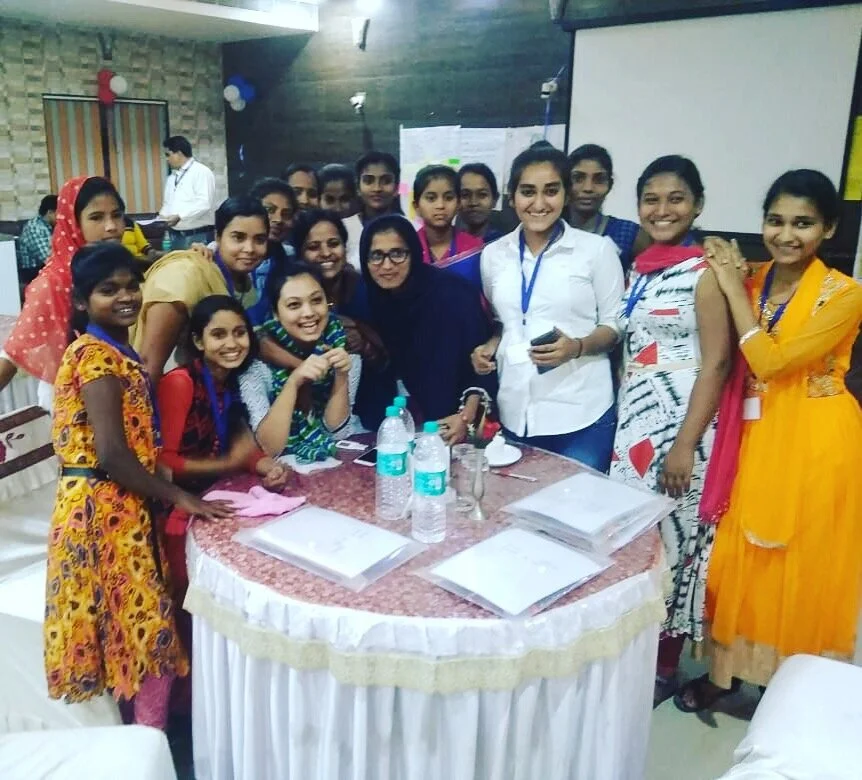Team perspective: A conversation with CSE trainer Ankita Rawat
We are so inspired by the talent, vision, and energy that we see in young leaders all around the world - so we're taking the time to profile a few people we've had the pleasure of working with over the last year.
Meet Ankita Rawat!
Ankita is a comprehensive sexuality education (CSE) trainer and brought her skills to our team this year as a part of the Splash Menstrual Health project. We recently had the pleasure of sitting down with Ankita to talk with her about her experience with CSE, her perspectives on menstrual health, and her vision for the future of youth leadership.
How did you first become interested in working with menstrual health?
I started my journey as a comprehensive sexuality education (CSE) trainer and was empowered with knowledge and skills to challenge myths and misconceptions as well as taboos in my own life. Menstruation is one of the core elements of CSE. When people born with female genitals start menstruating, they are pushed to a different world, which is full of restrictions. Instead of celebrating it, we start cursing it because we felt ashamed about it and made fun of it. My own personal experience of bullying and teasing in schools makes me a stronger advocate for this issue. I believe that everyone has the right to live with dignity and share the space with respect.
What do you think is missing for most young people when it comes to menstrual health education?
Young people lack support from their closest networks and safe space to challenge the norms in our society. It is necessary to empower girls to be agents of their own bodies and life. But with this, it is also important to create a supportive environment for girls to live their life with dignity and respect. As leaders in this sector, we have to think from the lens of adolescents and their power status in their own family, school, community.
If we only focus on transferring knowledge and skills to girls, we are ignoring the consequences they can face from a patriarchal society. Hence it is important to engage other stakeholders in the programs that focus on menstrual health so that we can minimize the structural violence against them.
What should boys know about menstruation?
Boys should know everything about menstruation. Just like they are aware of the solar system and universe, as they are part of this system. In the same way, they should learn about menstruation, because they are part of a system, where people who menstruate are part of their life.
To help boys understand menstruation and its effect on a girl’s life, they must have accurate information and understanding of why it happens, how it happens, when it happens, what are the benefits. With this information, they can understand how they can be supportive. It is really important for boys to understand that women and girls must be agents of their bodies and should have the right to make informed choices for themselves.
How can parents support their children through puberty and starting their periods?
Parents can support their kids by breaking the stigma and taboo around menstruation and working to challenge toxic gender norms. Parents play a crucial role in the lives of their children, especially through adolescence.
What was your experience like working on the splash project?
It was a great experience working on the prototypes for males, peers, and parents. I have been a CSE facilitator for nearly eight years, but working with a new audience always surprises me with new challenges. I also find it exciting to collaborate with experts and participants to discover new strategies and solutions.
I am glad that Splash is focusing on other stakeholders and trying to create a supportive environment for girls. I am sure it's an uncomfortable zone and it's going to be a challenge - but it is worth it.
If you could change ONE thing in the world to improve menstrual health, what would it be?
From my experiences working with adolescents and youth on menstrual health, I have also encountered the challenges young people face to challenge religious norms associated with menstruation. It becomes very hard for them to break religious norms within their family as well as the community they are part of. Hence, I would break the connection between religion and menstruation.
What does youth engagement mean to you?
To me, youth engagement means that youth have the power to innovate and find solutions to their own issues. Our work is to facilitate that conversation and provide them with knowledge and tools to make it an effective and efficient engagement.
You can find out more about Ankita’s work on the Splash Menstrual Health project here.




